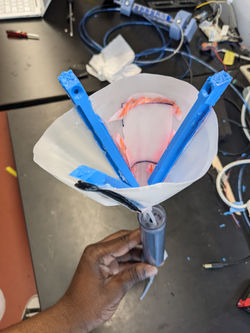Undergraduate Thesis: Epicardial Patch Delivery Device
Therapeutic Technology Design and Development Lab
After a myocardial infarction, a dense scar replaces tissue on the heart. This reduces cardiac function until the heart eventually deteriorates to failure, which can only be resolved with a full heart transplant at that point. Methods medical practitioners currently employ do not seek to recover heart function to pre-infarction levels early after infarct to prevent adverse remodeling altogether.
A proposed solution that addresses this seemingly overlooked area comes in the form of patches that adhere to the outer surface of the heart, mechanically reinforcing the infarct region. However, the invasive nature of the implantation procedure has limited the patches’ clinical translation since they would require open heart surgery.
In this study, I designed and developed a delivery tool that would adhere the hydrogel and composite based epicardial patches on infarcted hearts in a minimally invasive operation. The device is a collapsible and inflatable sleeve prototyped using thermoplastic polymer films and casted silicone rubber components, designed for minimally invasive subxiphoid surgery. It utilizes vacuum for stabilization during application.
By characterizing the material properties with a universe mechanical tester, it was found that the tool can reliably supply the necessary pressure to properly adhere the hydrogel patches. Through a series of ex vivo and in situ porcine experiments, it was found that the sleeve is effective at effectively positioning and adhering the patches to the epicardium.
Such a tool would be helpful in applying therapeutics like the patch, presenting a low-cost, accessible solution for interventionalists. This delivery tool is still in development, as it is on its fourth iteration and in the future, would require extensive preclinical studies before moving into human trials..
 |  |  |  |
|---|---|---|---|
 |  |  |
